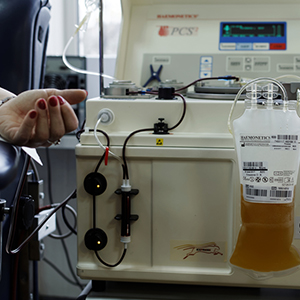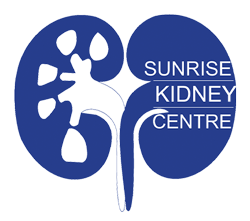Blood Plasmapheresis in Vijayawada
Antibodies in our bloodstream play a crucial role in defending against pathogens and foreign substances; however, in the context of an organ transplant, these same immune proteins might mistakenly identify the transplanted organ as a threat, triggering an immune response that can jeopardize the success of the transplant.
What is Plasmapheresis?
Plasmapheresis is a procedure similar to dialysis in that it involves the removal and replacement of a component of the blood, specifically targeting the plasma. Unlike dialysis, which primarily filters waste products from the blood, plasmapheresis selectively extracts plasma to remove harmful antibodies or other pathogenic substances, thereby helping to treat autoimmune and other plasma-related disorders. It can help reduce inflammation, autoimmunity, and other pathological substances, providing relief in conditions like Guillain-Barré syndrome, myasthenia gravis, and plasmapheresis-related complications. Kidney hospitals in Vijayawada typically perform the process in a specialized medical setting and carefully monitor it to ensure safety and effectiveness.

Preparing for Plasmapheresis
To optimize your plasmapheresis experience and reduce potential symptoms and risks, prioritize eating a balanced, protein-rich meal before the procedure while avoiding excessive phosphorous, sodium, and potassium in the days leading up to it. Ensure you get a restful night's sleep beforehand and stay well-hydrated by drinking plenty of fluids. Consult your healthcare provider to update your vaccinations against common infections, and avoid smoking and tobacco use to support your immune health. Additionally, maintaining good overall health and following your doctor's specific instructions can help make the process smoother and safer.
Procedure
The process involves a functioning native fistula, graft, or dialysis catheter in place. If a catheter is used, one lumen connects to the tubing system to extract blood to the machine, while the other lumen returns filtered blood to the patient. For fistulas or grafts, needles are inserted similarly to dialysis procedures, often causing mild discomfort comparable to that experienced during blood donation. In transplant candidates, multiple plasmapheresis sessions are often scheduled both before and after surgery to reduce antibody levels, thereby decreasing the risk of rejection and improving transplant success.
Recovery
Recovery from the procedure is typically quick, with most individuals not requiring an overnight hospital stay, though fatigue is common. To ensure proper healing, rest adequately and avoid driving or strenuous activities. If symptoms such as persistent discomfort or bleeding occur after leaving the hospital, it’s important to promptly consult your healthcare provider. While many people experience tiredness post-procedure, they generally handle the process well, emphasizing the importance of proper preparation beforehand and adherence to your doctor’s aftercare instructions to achieve the best outcome.
Why prefer Plasmapheresis?
Blood Plasmapheresis in Vijayawada is used to treat weakness or autoimmune disorders, can sometimes provide symptom relief within a few days, although the timeframe varies depending on the specific condition; for some, it may take weeks before noticeable improvements occur. Keep in mind that plasmapheresis typically offers only temporary alleviation of symptoms, often necessitating repeat sessions, with the duration of benefits influenced by the severity and nature of the underlying disease. Your healthcare provider can give you a clearer understanding of how long the treatment might be effective for your particular situation and how frequently you may need to undergo the procedure.
To know more about blood plasmapheresis treatment, you can contact Sunrise Kidney Centre directly via their official website or phone number to make an appointment with Dr. M.V. Sai Krishna, renowned for his extensive expertise in managing complex kidney conditions.

